Vishnu Ashtothram, a revered Hindu devotional hymn, comprises 108 sacred names of Lord Vishnu, embodying his divine attributes and significance. It is a powerful prayer for spiritual growth and peace.
1.1 What is Vishnu Ashtothram?
Vishnu Ashtothram, or Sri Vishnu Ashtottara Shatanamavali, is a sacred Hindu hymn consisting of 108 divine names of Lord Vishnu. Each name highlights a unique attribute or form of Vishnu, symbolizing his universal protection and divine grace. This prayer is widely revered for its spiritual significance and is often recited by devotees to seek blessings, peace, and inner harmony. The Telugu PDF version makes it accessible for devotees to chant with devotion and clarity.
1.2 Significance of the 108 Names
The 108 names in Vishnu Ashtothram hold profound spiritual significance, each representing a unique attribute or divine form of Lord Vishnu. The number 108 symbolizes cosmic completeness and spiritual perfection. Reciting these names is believed to bring divine blessings, peace, and liberation. They serve as a meditation tool, helping devotees connect with Vishnu’s protective and nurturing essence. The Telugu PDF version ensures accessibility, preserving the hymn’s cultural and spiritual impact for modern devotees.

Overview of the Telugu PDF Version
The Telugu PDF version of Vishnu Ashtothram provides easy access to the sacred hymn, offering the 108 names of Lord Vishnu in clear Telugu script for devotional recitation.
2.1 Availability and Sources
The Telugu PDF version of Vishnu Ashtothram is widely available online, with sources including spiritual websites, cultural platforms, and religious forums. Devotees can easily download it for free from sites like Vaidika Vignanam or Greater Telugu, ensuring accessibility for all. Its digital format allows seamless sharing and reading, making it a convenient resource for daily worship and spiritual practices in the Telugu-speaking community.
2.2 Language and Cultural Significance
The Telugu version of Vishnu Ashtothram holds deep cultural and linguistic significance, preserving ancient spiritual traditions. It connects Telugu-speaking communities to their heritage, offering a sacred medium for worship. The script and language resonate emotionally, making it a cherished part of daily rituals and festivals, fostering unity and devotion among followers of Lord Vishnu.
Spiritual Significance
Vishnu Ashtothram is a sacred hymn that embodies the essence of devotion to Lord Vishnu, offering spiritual enlightenment and inner peace through its divine verses and chants.
3.1 Meaning and Benefits of Recitation
Reciting Vishnu Ashtothram in Telugu fosters deep devotion and spiritual growth. Each of the 108 names carries profound meaning, offering protection, prosperity, and peace. Regular recitation calms the mind, strengthens faith, and helps seekers connect with Lord Vishnu’s divine energy, fostering mental well-being and a sense of purpose in life.
3.2 Associated Spiritual Practices
Recitation of Vishnu Ashtothram is often accompanied by meditation, offerings to Lord Vishnu, and chanting in a serene environment. Devotees perform rituals like lighting lamps, offering flowers, and chanting mantras to enhance spiritual focus. Regular practice fosters inner peace and aligns one with divine energy. Many followers also fast or observe vows to deepen their devotion and seek blessings from Lord Vishnu.
Downloading the PDF
The Vishnu Ashtothram Telugu PDF is easily accessible through reputable platforms like Greater Telugu and Vaidika Vignanam, offering devotees worldwide convenient access to this sacred text.
4.1 Process and Popular Platforms
Downloading the Vishnu Ashtothram Telugu PDF is straightforward. Devotees can access it from platforms like Vaidika Vignanam, Greater Telugu, and Prapatti Online. These websites offer free downloads, ensuring easy access to the sacred text. Users can search for “Vishnu Ashtothram Telugu PDF” on these sites, follow the download prompts, and obtain the document effortlessly. This convenience has made the hymn widely accessible for spiritual practices globally.
4.2 Considerations for Downloading
When downloading the Vishnu Ashtothram Telugu PDF, ensure the source is reliable to avoid malware. Respect copyright and use the text for personal devotion or study. Many websites offer free access, but verify the authenticity of the content. Downloading for commercial purposes may require permission. Always prioritize trusted platforms to maintain the sanctity and integrity of the sacred text.

Benefits of Recitation
Reciting Vishnu Ashtothram brings spiritual peace, divine blessings, and emotional harmony. It enhances mental well-being and strengthens devotion, fostering a deeper connection with Lord Vishnu.
5.1 Spiritual and Emotional Benefits
- Reciting Vishnu Ashtothram fosters deep spiritual growth and emotional balance.
- It enhances mental clarity, reduces stress, and brings inner peace.
- Devotees experience divine grace, strengthening their faith and connection with Lord Vishnu.
- The hymn’s rhythmic chanting calms the mind and uplifts the spirit.
- Regular recitation is believed to mitigate life’s challenges and attract positive energy.
- It cultivates gratitude, humility, and a sense of divine protection.
5.2 Personal Experiences and Studies
- Devotees share experiences of finding solace and strength through Vishnu Ashtothram recitation.
- Studies reveal its emotional healing properties, reducing stress and anxiety.
- Many testimonies highlight improved mental well-being and a deeper spiritual connection.
- Regular practitioners report feeling protected and guided by divine grace.
- The hymn’s accessibility in Telugu PDF has made it easier for devotees to incorporate it into daily worship.
- Personal stories often emphasize its role in fostering resilience and inner peace.
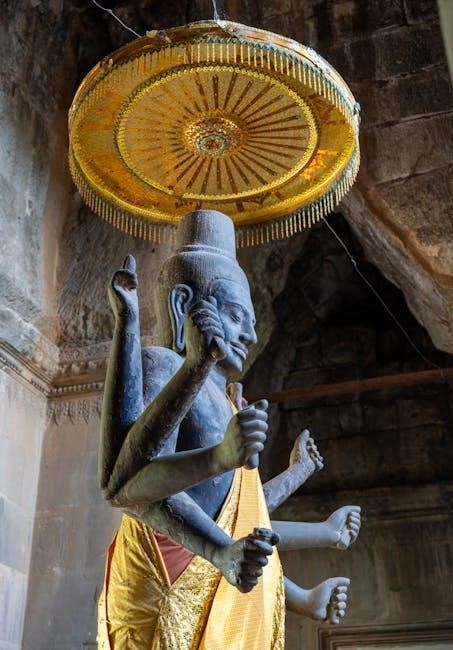
Cultural Importance
Vishnu Ashtothram holds deep cultural significance, featuring prominently in Telugu festivals and worship rituals. Its recitation fosters devotion and unity, enriching spiritual heritage and community bonds.
6.1 Role in Festivals and Worship
Vishnu Ashtothram plays a vital role in Telugu festivals and worship rituals. It is recited during sacred ceremonies like Vaikuntha Ekadashi and Dussehra, fostering devotion. Devotees chant the 108 names in temples and homes, often accompanied by offerings like flowers and prayers. This practice strengthens spiritual bonds and reinforces Lord Vishnu’s divine presence in cultural and religious celebrations, uniting the community in reverence and faith.
6.2 Impact on Telugu-Speaking Communities
Vishnu Ashtothram holds profound cultural and spiritual significance for Telugu-speaking communities. It strengthens their connection to Lord Vishnu, fostering devotion and unity. The Telugu PDF version has made it accessible for daily recitation, preserving traditions and enriching spiritual practices. This hymn is a cornerstone of faith, inspiring emotional well-being and a sense of belonging among devotees, while also passing down cultural values to future generations.

Transliteration and Pronunciation
The Telugu PDF version of Vishnu Ashtothram provides transliterated text, making it accessible to non-Telugu speakers. This ensures proper pronunciation and devotion during recitation.
7.1 Adaptation for Non-Telugu Speakers
The Telugu PDF version of Vishnu Ashtothram often includes transliterated text in Roman script, enabling non-Telugu speakers to recite the hymn with accuracy. This adaptation ensures that devotees worldwide can access and benefit from the sacred prayer, fostering spiritual unity. The transliteration maintains the original essence, allowing for proper pronunciation and devotion, making it a valuable resource for global followers of Lord Vishnu.
7.2 Tips for Effective Recitation
For effective recitation, focus on clear pronunciation and understanding the meaning of each name. Start with a prayer to Lord Vishnu, ensuring a calm and pure environment. Practice regularly to improve accuracy and devotion. Seek guidance from experienced devotees or gurus for proper intonation. Maintaining concentration enhances the spiritual impact, allowing the recitation to become a meaningful meditation. Consistency and sincerity are key to deriving maximum benefits.
Comparison with Vishnu Sahasranama
Vishnu Ashtothram and Vishnu Sahasranama both glorify Lord Vishnu, but Ashtothram has 108 names, while Sahasranama has 1000. Ashtothram is shorter and more accessible for daily recitation.
8.1 Similarities and Differences
Both Vishnu Ashtothram and Sahasranama extol Lord Vishnu’s virtues, emphasizing his divine attributes and omnipresence. However, Ashtothram is concise with 108 names, making it easier for devotees to recite daily, while Sahasranama, with 1000 names, offers a more detailed and elaborate praise. The shorter length of Ashtothram facilitates regular chanting, fostering spiritual connection and peace, whereas Sahasranama’s depth provides extensive philosophical insights, enriching devotion.
8.2 Understanding Both Hymns
Vishnu Ashtothram and Sahasranama both highlight Lord Vishnu’s divine attributes, but they differ in scope. Ashtothram, with 108 names, offers a concise yet powerful devotion, making it accessible for daily recitation. Sahasranama, with 1000 names, provides a deeper exploration of Vishnu’s nature, catering to those seeking profound theological understanding. Together, they enrich spiritual practices, offering devotees flexibility and depth in worship, fostering a stronger connection to the divine.

Mantras and Their Significance
The mantras in Vishnu Ashtothram are sacred chants that embody divine energy, fostering meditation and devotion. Their recitation is believed to purify the mind and soul, offering a profound connection to Lord Vishnu.
9.1 Key Mantras Within Ashtothram
The Vishnu Ashtothram includes powerful mantras like “Om Namo Narayanaya” and “Vishnu Vishnu Vishnu”, which are central to its recitation. These mantras embody devotion and purification, helping seekers connect deeply with Lord Vishnu. Each mantra carries specific spiritual significance, such as warding off negativity or granting peace. Reciting them with focus amplifies their divine energy, fostering inner harmony and spiritual elevation.
- Om Namo Narayanaya: A quintessential mantra symbolizing surrender to Vishnu.
- Vishnu Vishnu Vishnu: Repeated to invoke Vishnu’s protective grace.
- Shantakaram Bhujagasayanam: A mantra praising Vishnu’s serene and divine form.
9.2 Meanings and Implications
The mantras in Vishnu Ashtothram hold profound meanings, reflecting Lord Vishnu’s attributes and divine interventions. Each name symbolizes his role as a protector, savior, and sustainer of the universe. Reciting these mantras implies surrender to his divine will, seeking spiritual refuge and inner peace. The implications extend to purification of the soul, mitigation of karma, and cultivation of devotion, ultimately fostering a deeper connection with the divine.
- Spiritual Growth: The mantras guide devotees toward self-realization and divine alignment.
- Divine Protection: They invoke Vishnu’s grace for safety and prosperity in life.
- Inner Peace: Regular recitation calms the mind and brings emotional balance.
Understanding Each Name
Understanding each name in Vishnu Ashtothram reveals Lord Vishnu’s divine attributes and his role in sustaining the universe. Each name carries spiritual significance, symbolizing his protection and grace.
10.1 Selection Process of 108 Names
The 108 names of Lord Vishnu in Ashtothram are carefully chosen to reflect his divine attributes, cosmic roles, and benevolent nature. Each name highlights his protection, wisdom, and grace, offering devotees a profound way to connect with his divinity. The selection process ensures a comprehensive representation of Vishnu’s essence, making the recitation a meaningful tribute to his universal presence and eternal guardianship.
10.2 Examples and Interpretations
Examples from Vishnu Ashtothram include names like “Vishnu” (the pervader) and “Hari” (the remover of sins), symbolizing his universal presence and redemptive grace; Each name carries deep spiritual meaning, reflecting his roles as protector, preserver, and destroyer of evil. These interpretations help devotees connect with Vishnu’s divine attributes, fostering devotion and understanding of his cosmic significance in maintaining balance and harmony in the universe.
Devotional Practices
Vishnu Ashtothram is often recited during daily puja, festivals, and special ceremonies, fostering spiritual connection and devotion. Regular recitation is believed to bring peace, prosperity, and divine grace.
11.1 Rituals and Traditions
Vishnu Ashtothram is an integral part of worship, often recited during daily puja, festivals, and special ceremonies. Devotees perform rituals like offering flowers, lighting lamps, and maintaining purity. The hymn is typically chanted with devotion, accompanied by traditional instruments, enhancing its spiritual impact. These customs strengthen the connection with Lord Vishnu, fostering a sense of tranquility and divine presence in the community.
11.2 Optimal Times for Recitation
The ideal times for reciting Vishnu Ashtothram are during the early morning (Brahma Muhurta) and evening (Sunset). These periods are considered sacred, offering a calm and pure atmosphere for devotion. Additionally, recitation on auspicious days like Ekadashi or during festivals dedicated to Lord Vishnu amplifies its spiritual impact. Consistency and a focused mind are key to deriving maximum benefits from this sacred hymn.
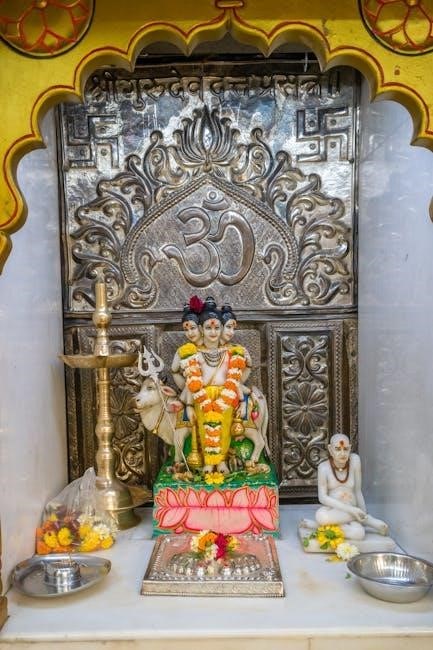
Role of Lord Vishnu in Hinduism
Lord Vishnu, the preserver, upholds cosmic order and dharma through divine avatars, embodying protection and divine grace in Hindu cosmology and worship as the supreme deity.
12.1 Overview of His Significance
Lord Vishnu, as the preserver, holds a central role in Hinduism, maintaining cosmic order and balance. Through divine avatars, he restores dharma and protects devotees, embodying divine grace and protection. His benevolence and eternal presence make him a revered deity, symbolizing hope and salvation for humanity, ensuring harmony and peace in the universe.
12.2 Relevance to Ashtothram
Lord Vishnu’s divine attributes and roles are beautifully encapsulated in the Vishnu Ashtothram, which glorifies his 108 names. Each name reflects his protective, preservative, and benevolent nature, resonating with his cosmic significance. Reciting these names invokes divine grace, fostering spiritual growth and a deep connection with the divine, making the Ashtothram a profound devotional practice dedicated to Lord Vishnu.
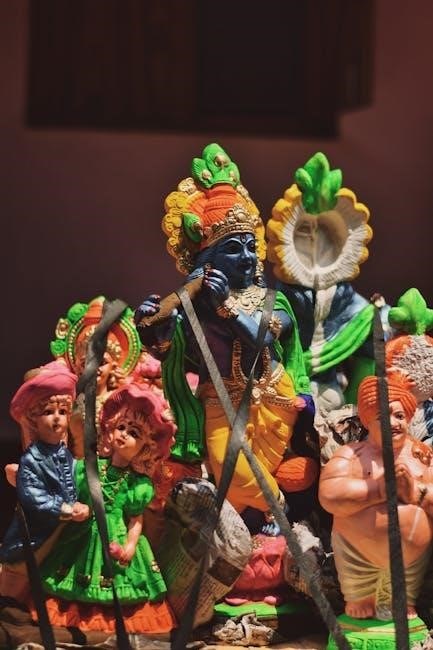
Benefits of Chanting
Chanting Vishnu Ashtothram offers spiritual growth, mental peace, and positive energy. It enhances focus, calms the mind, and fosters emotional well-being, connecting devotees deeply with Lord Vishnu.
13.1 Material and Spiritual Gains
Chanting Vishnu Ashtothram brings prosperity, good fortune, and spiritual growth. It is believed to grant material success and protection while fostering mental clarity and inner peace.
Devotees often experience a deeper connection with Lord Vishnu, enhancing their faith and devotion. Regular recitation is also thought to remove obstacles and fulfill heartfelt wishes, promoting overall well-being.
13.2 Mental Well-Being
Chanting Vishnu Ashtothram promotes mental clarity and emotional balance. The rhythmic recitation calms the mind, reducing stress and anxiety. It fosters a sense of inner peace, helping devotees manage life’s challenges with equanimity. Regular practice enhances focus and mental stability, providing solace and spiritual comfort in times of turmoil.
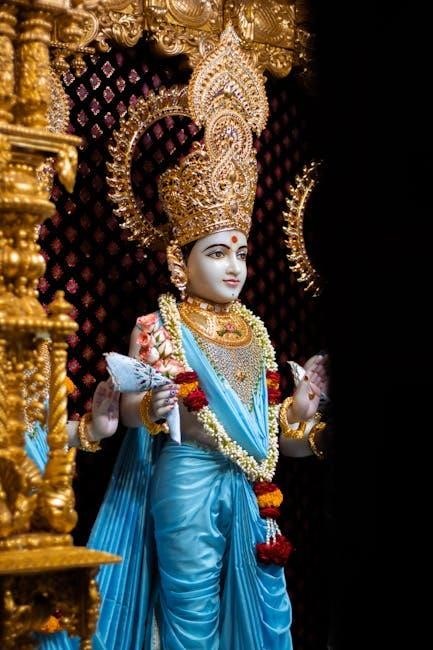
Digital Access and Its Impact
Digital platforms have made Vishnu Ashtothram in Telugu easily accessible, enabling global devotees to download and recite it effortlessly, fostering widespread spiritual devotion and cultural preservation.
14.1 Ease of Access via Technology
Technology has simplified access to the Vishnu Ashtothram in Telugu, with PDF versions readily available on various digital platforms. Devotees can easily download and recite the hymn.
This convenience has made it possible for people worldwide to access and benefit from the spiritual significance of Vishnu Ashtothram, fostering devotion and cultural preservation.
14;2 Implications for Modern Devotion
The digital availability of Vishnu Ashtothram in Telugu PDF has transformed modern devotion, enabling easy access for global devotees. This convenience fosters spiritual practices, making ancient hymns relevant in contemporary life. The PDF format ensures preservation of cultural heritage while catering to tech-savvy worshippers.
It bridges generations, allowing seamless integration of traditional rituals into modern lifestyles, thus enhancing spiritual connectivity and devotion.
Vishnu Ashtothram in Telugu PDF is a significant devotional resource, offering spiritual growth and peace. Its accessibility ensures timeless divine connection for modern devotees.
15.1 Summary of Key Points
Vishnu Ashtothram, a sacred hymn with 108 names of Lord Vishnu, holds deep spiritual significance, offering devotees a path to divine connection and inner peace. The Telugu PDF version provides easy access to this revered prayer, making it a valuable resource for worship and reflection. Its cultural and spiritual importance continues to inspire devotees, fostering a deeper understanding of Lord Vishnu’s attributes and blessings.
15.2 Final Thoughts on Significance
Vishnu Ashtothram, with its 108 divine names, remains a cornerstone of devotion, offering spiritual growth and peace. The Telugu PDF version bridges tradition with modern accessibility, ensuring its timeless significance endures. It not only strengthens cultural ties but also provides a profound means of worship, making Lord Vishnu’s blessings accessible to all devotees in the digital age, fostering enduring faith and spiritual harmony.
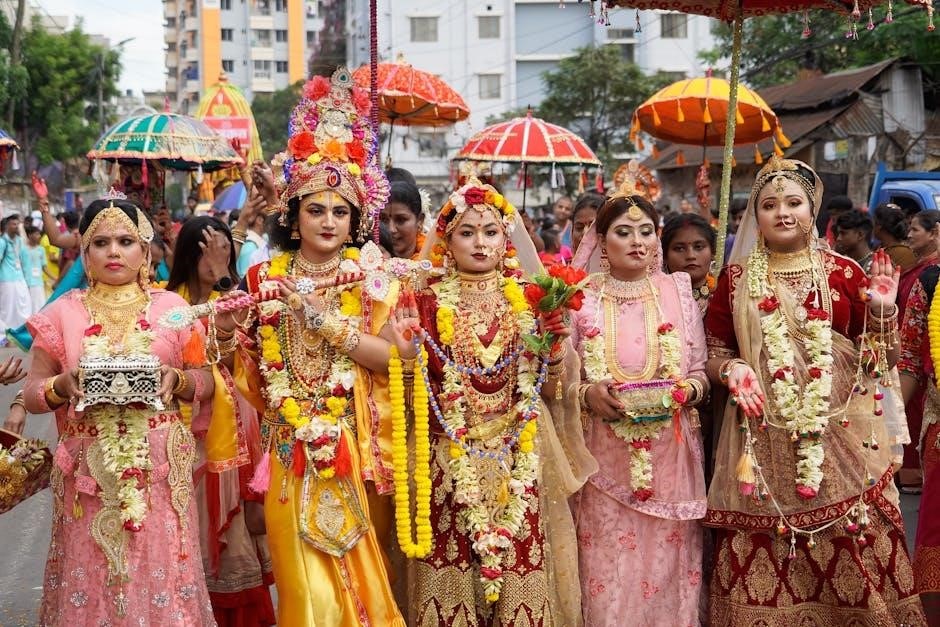
Resources for Further Reading
Explore sacred texts like Vaidika Vignanam and Prapatti Online for detailed insights. Visit Greater Telugu for diverse spiritual literature and devotional communities, enriching your journey with Lord Vishnu.
16.1 Recommended Books and Websites
Key resources include Vaidika Vignanam, offering extensive spiritual literature, and Greater Telugu, providing Telugu scripts of sacred hymns. Websites like Prapatti Online and Sri Vaishnava Sampradhaya host stotras, MP3s, and scholarly insights. These platforms cater to both devotees and researchers, offering authentic materials for deepening spiritual understanding and practice.
16.2 Devotional Communities and Forums
Devotional communities like Prapatti Online and Sri Vaishnava Sampradhaya offer platforms for sharing spiritual insights and resources. These forums connect devotees globally, fostering discussions on Vishnu Ashtothram and related hymns. They provide support, organize recitation sessions, and host scholarly discussions, enriching the spiritual journey of participants and promoting unity among followers of Lord Vishnu.

